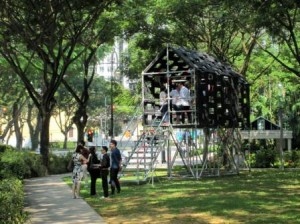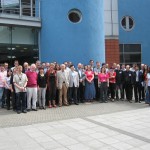STILT HOUSE is a Fine Art led interdisciplinary research project involving Art, Architecture and Civil Engineering.

The engagement of artists with complex issues such as climate change presents both opportunities, and inherent contradictions, relating to the symbolic, creative and material characteristics of art, and issues of public understanding of the representation of science and intervention and communication through an artistic viewpoint. Importantly, such artworks can place an emphasis on environmental issues experienced both materially and conceptually within local and global contexts. This provides the possibility to influence the public’s attitudes and behaviours in arenas beyond those of the traditional domains of scientists, engineers and city planners.
STILT HOUSE is a site-specific artwork consisting of two interconnected structures that are made from recycled plastic waste, exhibited as part of HubtoHub, Archifest 2011 in Singapore. Sited at Dhoby Ghaut Green the architectural installation offers, through it’s perforated black walls, an elevated and translucent perspective on the surrounding land and cityscape. By reinterpreting this traditional stilt housing typology, which was originally made from sustainable local materials and was ecologically adapted to the specific climate and landscape, STILT HOUSE encourages us to rethink our relationship with the environment we inhabit. It also confronts us with the debris of our consumer society in the unexpected form of an innovative building material that translates waste into new productive and aesthetic uses.
Website: http://www.hubtohub.sg/exhibition.html#team-DhobyGhautGreen
STILT HOUSE was created by Prof Wolfgang Weileder (Fine Art, Newcastle University), in collaboration with Prof Simon Guy (Manchester Architecture Research Institute) and CESER Researcher Dr Oliver Heidrich (Civil Engineering, Newcastle University).
Prof Simon Guy and CESER Researcher Dr Oliver Heidrich are currently writing a paper on the project addressing the following questions:
- Can urban art installations both represent and intervene in issues of climate change/sustainability through their selection of materials?
- Does the answer have anything useful to contribute towards discussions of sustainable cities?
 At the end of February 2013 a successful and highly enjoyable Climate Change Adaptation Training School was organised by Tecnalia, CESER and the International Council for Local Environmental Initiatives (ICLEI). Climate change adaptation managers for cities from 13 European countries attended the Training School which was held in Bilbao, Spain. Alistair Ford travelled by train from Newcastle to lead a day on urban integrated assessment modelling based on our Integrated Systems Demonstration of Cities .
At the end of February 2013 a successful and highly enjoyable Climate Change Adaptation Training School was organised by Tecnalia, CESER and the International Council for Local Environmental Initiatives (ICLEI). Climate change adaptation managers for cities from 13 European countries attended the Training School which was held in Bilbao, Spain. Alistair Ford travelled by train from Newcastle to lead a day on urban integrated assessment modelling based on our Integrated Systems Demonstration of Cities .





